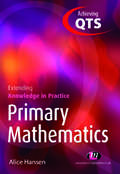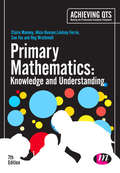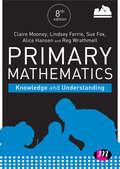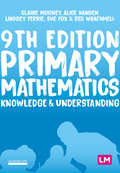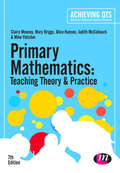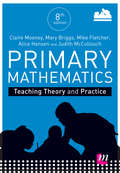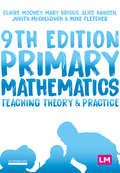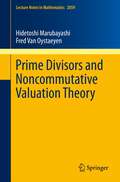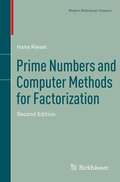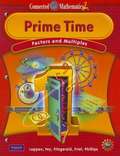- Table View
- List View
Primary Mathematics, Workbook, 2B, Standards Edition
by Jennifer HoerstThe Primary Mathematics Standards Edition is a series of elementary math textbooks and workbooks from the publishers of Singapore's successful Primary Mathematics series. Newly adapted to align with the Mathematics Framework for California Public Schools, the program aims to equip students with sound concept development, critical thinking and efficient problem-solving skills. Features of the series: Mathematical concepts are introduced in the opening pages and taught to mastery through specific learning tasks that allow for immediate assessment and consolidation. The modeling method enables students to visualize and solve mathematical problems quickly and efficiently. The Concrete > Pictorial > Abstract approach enables students to encounter math in a meaningful way and translate mathematical skills from the concrete to the abstract. The pencil icon provides quick and easy reference from the Textbook to the relevant Workbook pages. The direct correlation of the Workbook to the Textbook facilitates focused review and evaluation. New mathematical concepts are introduced throughout a spiral progression that builds on concepts already taught and mastered. Metacognition is employed as a strategy for learners to monitor their thinking processes in problem solving. Speech and thought bubbles provide guidance through the thought processes, making even the most challenging problems accessible to students. Color patch is used to invite active student participation and to facilitate lively discussion about the mathematical concepts taught. Reviews in the Workbooks for 1A-1B and regular reviews in the Textbooks and Workbooks for 2A-5B provide consolidation of concepts learned. The glossary effectively combines pictorial representation with simple mathematical definitions to provide a comprehensive reference guide for students. Answer keys booklets are not included, but are available - one for Primary 1A-3B and one for Primary 4A-6B.
Primary Mathematics, Workbook, 4A, Standards Edition
by Marshall Cavendish International (Singapore) Private LimitedTextbook.
Primary Mathematics, Workbook, 5A, Standards Edition
by Marshall Cavendish CorporationNIMAC-sourced textbook
Primary Mathematics: Audit and Test
by Claire Mooney Mike FletcherThis book supports trainees on primary initial teacher training courses where a secure knowledge and understanding of mathematics is required for the award of Qualified Teacher Status (QTS). A rigorous test enables trainees to identify their strengths and weaknesses in mathematics and this can be revisited in order to monitor and evaluate progress towards QTS. Trainees are able to direct their studies more usefully and quickly develop confidence in topics they find difficult. This edition is fully up to date with the 2007 QTS Standards.
Primary Mathematics: Extending Knowledge In Practice (Achieving QTS Extending Knowledge in Practice LM Series)
by Alice HansenStill the biggest concern for many on initial teacher training courses is the acquisition of subject knowledge and the ability to translate that into effective teaching. This book addresses this - building on the core subject knowledge covered in the Achieving QTS series and relating it to classroom practice. It supports trainees in extending and deepening their knowledge of Maths and demonstrating how to apply it to planning and implementing lessons. Practical and up-to-date teaching examples are used to clearly contextualize subject knowledge. A clear focus on classroom practice helps trainees to build confidence and develop their own teaching strategies.
Primary Mathematics: Knowledge And Understanding (Achieving QTS Series)
by Claire Mooney Alice Hansen Lindsey Ferrie Reg Wrathmell Mrs Sue FoxThe Sixth Edition of this popular core text is the essential subject knowledge book for primary mathematics. Helping trainees to establish and consolidate a secure subject knowledge and understanding of primary mathematics, it promotes the development of confident, creative and effective teachers. This lates edition is linked to the 2012 Teachers' Standards. Providing full coverage of the required subject knowledge for primary mathematics, this is a core text for primary trainees working towards QTS. Self assessment questions enable readers to understand their own level of knowledge and an M level extension feature in all chapters suggests avenues for further study at Master's level. Research summaries include the latest works in primary mathematics and, throughout interactive tasks engage the reader with the text, helping them to link theory and practice. Trainees will find it helpful to use this book alongside Primary Mathematics Teaching Theory and Practice. About the Achieving QTS series All the books in this successful series support trainees through their initial teacher training and guide them in the acquistion of their subject knowledge, understanding and classroom practice. All new titles within the series link to the 2012 Teachers' Standards and take in to account recent changes in Initial Teacher Training.
Primary Mathematics: Knowledge And Understanding (Achieving QTS Series)
by Sue Fox Claire Mooney Alice Hansen Reg Wrathmell Lindsey DavidsonSecure subject knowledge and understanding is the foundation of confident, creative and effective teaching. To help your students master this, the 8th edition of this established text now comes with a range of online resources: Interactive Maths subject knowledge audit: to assess your students' overall performance and ensure they have an accurate picture of their ability. Reflective self-assessment questions: to help consolidate students’ understanding of each chapter topic and monitor their learning as they work through the book. Glossary: building students' knowledge of tricky terminology. Covering the whole primary curriculum, this edition also includes updated interactive activities throughout the book to engage students in their learning and enable discussion. Using this book in conjunction with the free online resources really makes this the complete package for developing Mathematics subject knowledge.
Primary Mathematics: Knowledge and Understanding
by Sue Fox Claire Mooney Alice Hansen Lindsey Ferrie Reg WrathmellThe 6th edition of this popular core text is the essential subject knowledge book for primary mathematics. Helping trainees to establish and consolidate a secure subject knowledge and understanding of primary mathematics, it promotes the development of confident, creative and effective teachers. This 6th edition is linked to the 2012 Teachers' Standards. Providing full coverage of the required subject knowledge for primary mathematics, this is a core text for primary trainees working towards QTS. Self assessment questions enable readers to understand their own level of knowledge and an M level extension feature in all chapters suggests avenues for further study at Masters level. Research summaries include the latest works in primary mathematics and throughout interactive tasks engage the reader with the text, helping them to link theory and practice. Trainees will find it helpful to use this book alongside Primary Mathematics Teaching Theory and Practice. About the Achieving QTS series All the books in this successful series support trainees through their initial teacher training and guide them in the acquistion of their subject knowledge, understanding and classroom practice. All new titles within the series link to the 2012 Teachers' Standards and take in to account recent changes in Initial Teacher Training.
Primary Mathematics: Knowledge and Understanding (Achieving QTS Series)
by Sue Fox Claire Mooney Alice Hansen Reg Wrathmell Lindsey DavidsonAll the subject knowledge you need to teach primary Mathematics. Secure subject knowledge and understanding is the foundation of confident, creative and effective teaching. To help you master this, this comprehensive text includes subject knowledge from each part of the primary Mathematics curriculum and comes with a wide range of resources so you can test your knowledge as you progress through the course. an online Mathematics subject knowledge audit with the ability to share results with lecturers new end of chapter self-assessment questions Interactive tasks a Maths subject knowledge checklist useful weblinks for primary Maths teaching Recommended further reading The 9th edition has been updated in line with new guidance and framework updates, inluding the new EYFS, as well as links to new research.
Primary Mathematics: Knowledge and Understanding (Achieving QTS Series)
by Sue Fox Claire Mooney Alice Hansen Reg Wrathmell Lindsey DavidsonAll the subject knowledge you need to teach primary Mathematics. Secure subject knowledge and understanding is the foundation of confident, creative and effective teaching. To help you master this, this comprehensive text includes subject knowledge from each part of the primary Mathematics curriculum and comes with a wide range of resources so you can test your knowledge as you progress through the course. an online Mathematics subject knowledge audit with the ability to share results with lecturers new end of chapter self-assessment questions Interactive tasks a Maths subject knowledge checklist useful weblinks for primary Maths teaching Recommended further reading The 9th edition has been updated in line with new guidance and framework updates, inluding the new EYFS, as well as links to new research.
Primary Mathematics: Teaching Theory And Practice (Achieving QTS Series)
by Claire Mooney Alice Hansen Mary Briggs Mike Fletcher Ms Judith MccullouchThe Sixth Edition of this popular core text provides the essential teaching theory and practice for primary mathematics. It promotes effective teaching through secure pedagogical knowledge, covering the key skills of planning, monitoring and assessment and class management, and relating these specifically to primary mathematics. This Sixth Edition is linked to the 2012 Teachers' Standards. With full coverage of the theory and practice required for effective and creative mathematics teaching, this text is an essential guide for all trainees working towards QTS. Throughout, practical guidance and features support trainees to translate this learning to the classroom, embed ICT in their lessons and to understand the wider context of their teaching. Trainees will find it helpful to use this book alongise Primary Mathematics Knowledge and Understanding. About the Achieving QTS series All the books in this successful series support trainees through their initial teacher training and guide them in the acquisition of their subject knowledge, understanding and classroom practice. All new titles within the series link to the 2012 Teachers' Standards and take into account recent changes in Initial Teacher Training.
Primary Mathematics: Teaching Theory And Practice (Achieving QTS Series)
by Claire Mooney Alice Hansen Mary Briggs Mike Fletcher Ms Judith McCullouchAn extensive knowledge of the primary Mathematics curriculum is not enough for trainee teachers, they need to know how to teach Maths in the primary classroom. This is the essential teaching theory and practice text for primary Mathematics that takes a focused look at the practical aspects of teaching. It covers the important skills of classroom management, planning, monitoring and assessment and relates these specifically to primary Maths, with new material on assessment without levels. And to support students even further with the very latest strategies in classroom practice, this 8th edition now includes online resources: Practical lesson ideas for the classroom The Primary National Curriculum for Mathematics in Key Stages one and two Tips for planning primary Mathematics Useful weblinks for primary Mathematics teaching
Primary Mathematics: Teaching Theory and Practice
by Claire Mooney Alice Hansen Mary Briggs Mike Fletcher Judith MccullouchMooney, Fletcher (both U. of Southampton), Briggs (U. of Warwick), Hansen (St. Martin's College, Lancaster), and McCullouch (U. of Winchester) present a revised text for primary trainee teachers working towards Qualified Teacher Status in the UK, also suitable as a reference for Newly Qualified Teachers, mentors, curriculum coordinators, and other education professionals. The text addresses the management of mathematics learning as well as progression and misconceptions in primary mathematics. The third edition includes new reflective tasks, greater reference to the role and use of ICT in mathematics teaching, more emphasis on the National Curriculum and new Primary Framework for mathematics, and new material on assessment for learning, using and applying mathematics and developing thinking skills. Distributed in the US by ISBS. Annotation ©2008 Book News, Inc. , Portland, OR (booknews. com)
Primary Mathematics: Teaching Theory and Practice (Achieving QTS Series)
by Claire Mooney Alice Hansen Mary Briggs Mike Fletcher Judith McCullouchAn extensive knowledge of the primary Mathematics curriculum is not enough for you as a trainee teacher, you need to know how to teach Mathematics in the primary classroom. This is the essential teaching theory and practice text for primary Mathematics that takes a focused look at the practical aspects of teaching. It covers the important skills of classroom management, planning, monitoring and assessment and relates these specifically to primary Maths. Practical guidance, features and resources help you translate your learning to the classroom and understand the wider context of teaching: - Online practical lesson ideas for the classroom - The Primary National Curriculum for Mathematics in Key Stages one and two - Tips for planning primary Maths - Useful weblinks for primary Mathematics teaching The ninth edition of this popular book includes a new chapter on ′Mathematics in the primary classroom′ exploring primary mathematics teaching today. It is also updated to include the new ′Ready to progress′ criteria.
Primary Mathematics: Teaching Theory and Practice (Achieving QTS Series)
by Claire Mooney Alice Hansen Mary Briggs Mike Fletcher Judith McCullouchAn extensive knowledge of the primary Mathematics curriculum is not enough for you as a trainee teacher, you need to know how to teach Mathematics in the primary classroom. This is the essential teaching theory and practice text for primary Mathematics that takes a focused look at the practical aspects of teaching. It covers the important skills of classroom management, planning, monitoring and assessment and relates these specifically to primary Maths. Practical guidance, features and resources help you translate your learning to the classroom and understand the wider context of teaching: - Online practical lesson ideas for the classroom - The Primary National Curriculum for Mathematics in Key Stages one and two - Tips for planning primary Maths - Useful weblinks for primary Mathematics teaching The ninth edition of this popular book includes a new chapter on ′Mathematics in the primary classroom′ exploring primary mathematics teaching today. It is also updated to include the new ′Ready to progress′ criteria.
Prime Divisors and Noncommutative Valuation Theory
by Fred Van Oystaeyen Hidetoshi MarubayashiClassical valuation theory has applications in number theory and class field theory as well as in algebraic geometry, e.g. in a divisor theory for curves. But the noncommutative equivalent is mainly applied to finite dimensional skewfields. Recently however, new types of algebras have become popular in modern algebra; Weyl algebras, deformed and quantized algebras, quantum groups and Hopf algebras, etc. The advantage of valuation theory in the commutative case is that it allows effective calculations, bringing the arithmetical properties of the ground field into the picture. This arithmetical nature is also present in the theory of maximal orders in central simple algebras. Firstly, we aim at uniting maximal orders, valuation rings, Dubrovin valuations, etc. in a common theory, the theory of primes of algebras. Secondly, we establish possible applications of the noncommutative arithmetics to interesting classes of algebras, including the extension of central valuations to nice classes of quantized algebras, the development of a theory of Hopf valuations on Hopf algebras and quantum groups, noncommutative valuations on the Weyl field and interesting rings of invariants and valuations of Gauss extensions.
Prime Numbers and Computer Methods for Factorization
by Hans RieselFrom the original hard cover edition: In the modern age of almost universal computer usage, practically every individual in a technologically developed society has routine access to the most up-to-date cryptographic technology that exists, the so-called RSA public-key cryptosystem. A major component of this system is the factorization of large numbers into their primes. Thus an ancient number-theory concept now plays a crucial role in communication among millions of people who may have little or no knowledge of even elementary mathematics. Hans Riesel's highly successful first edition of this book has now been enlarged and updated with the goal of satisfying the needs of researchers, students, practitioners of cryptography, and non-scientific readers with a mathematical inclination. It includes important advances in computational prime number theory and in factorization as well as re-computed and enlarged tables, accompanied by new tables reflecting current research by both the author and his coworkers and by independent researchers. The book treats four fundamental problems: the number of primes below a given limit, the approximate number of primes, the recognition of primes and the factorization of large numbers. The author provides explicit algorithms and computer programs, and has attempted to discuss as many of the classically important results as possible, as well as the most recent discoveries. The programs include are written in PASCAL to allow readers to translate the programs into the language of their own computers. The independent structure of each chapter of the book makes it highly readable for a wide variety of mathematicians, students of applied number theory, and others interested in both study and research in number theory and cryptography.
Prime Numbers and the Riemann Hypothesis
by Barry Mazur William SteinPrime numbers are beautiful, mysterious, and beguiling mathematical objects. The mathematician Bernhard Riemann made a celebrated conjecture about primes in 1859, the so-called Riemann Hypothesis, which remains to be one of the most important unsolved problems in mathematics. Through the deep insights of the authors, this book introduces primes and explains the Riemann Hypothesis. Students with minimal mathematical background and scholars alike will enjoy this comprehensive discussion of primes. The first part of the book will inspire the curiosity of a general reader with an accessible explanation of the key ideas. The exposition of these ideas is generously illuminated by computational graphics that exhibit the key concepts and phenomena in enticing detail. Readers with more mathematical experience will then go deeper into the structure of primes and see how the Riemann Hypothesis relates to Fourier analysis using the vocabulary of spectra. Readers with a strong mathematical background will be able to connect these ideas to historical formulations of the Riemann Hypothesis.
Prime Obsession: Bernhard Riemann and the Greatest Unsolved Problem in Mathematics
by John DerbyshireIn August 1859 Bernhard Riemann, a little-known 32-year old mathematician, presented a paper to the Berlin Academy titled: "On the Number of Prime Numbers Less Than a Given Quantity." In the middle of that paper, Riemann made an incidental remark -- a guess, a hypothesis. What he tossed out to the assembled mathematicians that day has proven to be almost cruelly compelling to countless scholars in the ensuing years. Today, after 150 years of careful research and exhaustive study, the question remains. Is the hypothesis true or false? Riemann's basic inquiry, the primary topic of his paper, concerned a straightforward but nevertheless important matter of arithmetic -- defining a precise formula to track and identify the occurrence of prime numbers. But it is that incidental remark -- the Riemann Hypothesis -- that is the truly astonishing legacy of his 1859 paper. Because Riemann was able to see beyond the pattern of the primes to discern traces of something mysterious and mathematically elegant shrouded in the shadows -- subtle variations in the distribution of those prime numbers. Brilliant for its clarity, astounding for its potential consequences, the Hypothesis took on enormous importance in mathematics. Indeed, the successful solution to this puzzle would herald a revolution in prime number theory. Proving or disproving it became the greatest challenge of the age.--It has become clear that the Riemann Hypothesis, whose resolution seems to hang tantalizingly just beyond our grasp, holds the key to a variety of scientific and mathematical investigations. The making and breaking of modern codes, which depend on the properties of the prime numbers, have roots in the Hypothesis. In a series of extraordinary developments during the 1970s, it emerged that even the physics of the atomic nucleus is connected in ways not yet fully understood to this strange conundrum. Hunting down the solution to the Riemann Hypothesis has become an obsession for many -- the veritable "great white whale" of mathematical research. Yet despite determined efforts by generations of mathematicians, the Riemann Hypothesis defies resolution. Alternating passages of extraordinarily lucid mathematical exposition with chapters of elegantly composed biography and history, Prime Obsession is a fascinating and fluent account of an epic mathematical mystery that continues to challenge and excite the world. Posited a century and a half ago, the Riemann Hypothesis is an intellectual feast for the cognoscenti and the curious alike. Not just a story of numbers and calculations, Prime Obsession is the engrossing tale of a relentless hunt for an elusive proof -- and those who have been consumed by it.
Prime Time, Factors and Multiples
by Glenda Lappan James T. Fey William M. FitzgeraldNIMAC-sourced textbook
Prime Time, Factors and Multiples
by Glenda Lappan James T. Fey William M. FitzgeraldNIMAC-sourced textbook
Prime Time: Factors and Multiples
by Glenda Lappan James T. Fey Susan N. Friel Elizabeth Difanis PhillipsNIMAC-sourced textbook
Prime Time: Factors and Multiples
by Glenda Lappan James T. Fey Susan N. Friel Elizabeth Difanis PhillipsThink about some of the ways you use numbers. You use them to count and to measure. You use number to make comparisons and to describe where places are located. Numbers help you communicate and find information. You use numbers to use technology and to make purchases. Numbers can help you think about situations such as those on the previous page.

